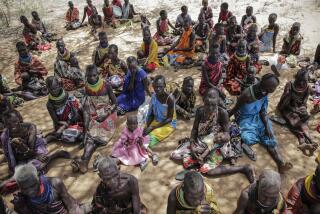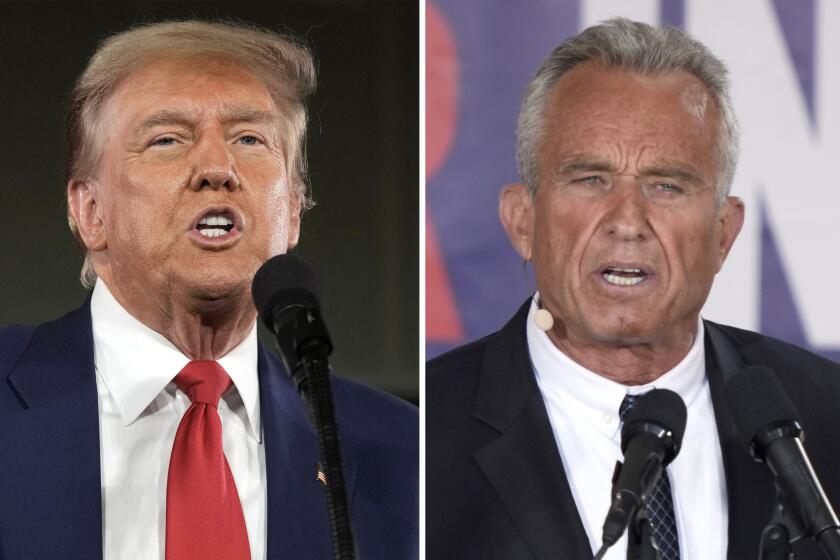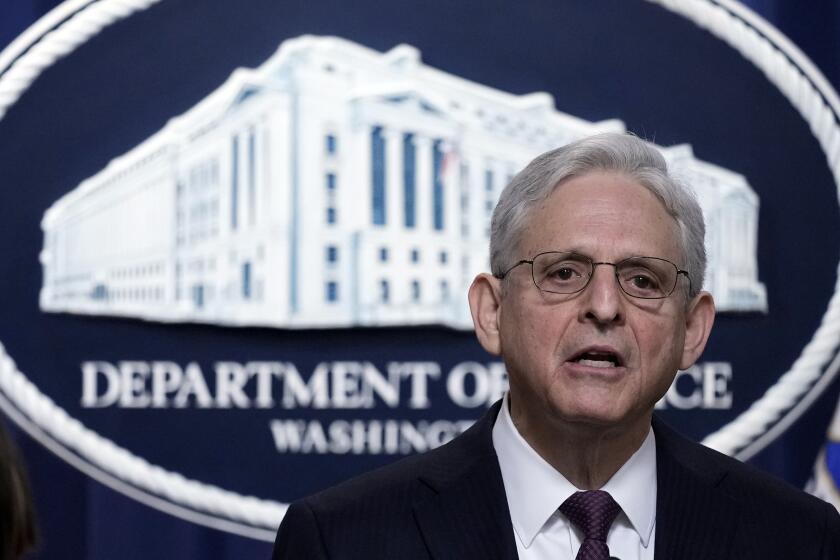Iraq Seen as Terror Target
The powerful car bomb that ripped through the Jordanian Embassy here last week marked a turning point for Iraq, suggesting that the country has become a terrorist target and raising the specter of spiraling violence as anti-Western extremists seize the opportunity to attack symbols of America and its supporters.
Although responsibility for the blast has yet to be determined, the sophisticated attack on a key U.S. ally without regard for civilian casualties brought into focus that the United States may be facing more than angry remnants of Saddam Hussein’s regime, which U.S. officials have blamed for a series of shooting and grenade attacks on American soldiers.
U.S. and Iraqi government officials as well as terrorism experts say anti-Western Islamic fighters have been infiltrating Iraq in significant numbers since the end of the war, taking advantage of chaos on the borders and the minimal police presence to establish themselves. Like Hussein loyalists, their goal is to drive the U.S. out of Iraq.
Although experts caution that the attack may have been carried out by Hussein’s supporters, the reported influx of foreign fighters raises serious concerns about the stability of Iraq.
“What we’re seeing now is jihadis coming in from all over, from Albania to Algeria,” said Vincent Cannistraro, a former CIA counter-terrorism chief.
“They’re answering the call from [Osama] bin Laden ... not to defend Saddam, but to defend Islam,” he said, noting that U.S. and allied intelligence officials believe that 500 to 600 of these foreign fighters have entered Iraq.
“In the future months and years, if the situation as far as Iraq’s stability remains the same, we will probably see a situation like in Chechnya and Bosnia,” in which Iraq becomes a new front for Islamic holy warriors, said Jean-Charles Brisard, a French private investigator and terrorism expert who has worked with the French intelligence services.
At one level, their appearance in Iraq is hardly a surprise. With 150,000 American troops on the ground as well as several thousand U.S. contractors and an array of Western humanitarian and media organizations, Iraq now offers a plethora of potential targets.
“The Iraqi government is an American proxy, and all of the public buildings in Iraq are now American,” said John Pike, director of GlobalSecurity.org, a research group. “Anyone who wants to strike an American target can blow up something in Baghdad. They don’t have to come all the way across the ocean.”
Why the attackers in Thursday’s deadly bombing chose the Jordanian Embassy rather than a more obviously U.S. target is unclear. Anti-American forces may have chosen Jordan because the country’s leader, King Abdullah II, offered quiet support for the war on Iraq and has been active in helping in the U.S.-declared war on terrorism.
Regardless, the choice of a civilian target is sure to increase the already high level of anxiety in the country. That is certainly the goal of the perpetrators, said Toby Dodge, a professor at the University of Warwick in Britain and one of that country’s top Iraq experts.
The bombers probably chose the embassy because it was an easier target than the heavily guarded headquarters of the U.S. authorities, he said. It shows that their clandestine network can lash out in ways that are hard to predict or defend against, he said.
“The oddity of the target is part of the message,” Dodge said.
While the focus since the blast has been on foreign fighters, several experts as well as L. Paul Bremer III, the U.S. civilian administrator of the country, were careful to say that the car bomb -- which killed at least 17 people -- could have been planted by Hussein loyalists eager to cause greater damage than they have been able to wreak on the U.S. military.
“It’s a fatal mistake to blame this on externalities,” Dodge said. “The people pulling the trigger are Iraqis.”
Late Saturday, five masked men who said they represented three unknown Iraqi Islamic groups called for attacks against occupying forces and warned other countries not to send troops.
But, in a videotape broadcast by Dubai-based Al Arabiya television, they also denounced the embassy bombing as “sabotage carried out by some spies and traitors who want to harm the resistance.”
In briefings after the bombing for the Iraqi Governing Council, a top Iraqi law enforcement officer who works closely with the Americans warned panel members of further violence.
“We expect there will be more attacks, suicide attacks, car bombs,” said Adel Abdul Mehdi, a senior advisor to the Supreme Council for Islamic Revolution in Iraq, one of the leading parties on the fledgling Iraqi Governing Council.
The current council president, Ibrahim Jafari, predicted that the attacks could spread to symbols of other foreign governments working closely with Iraq.
The consequences could be debilitating for almost every aspect of U.S. strategy in the country, forcing a cycle of increasingly strict security measures, which in turn would raise resentment of the American presence, some analysts said.
That would hamper U.S. plans to create a country with basic democratic freedoms and a stable environment attractive to foreign investors.
“It may be the beginning of a no-win scenario for U.S. forces,” said Charles V. Pena, director of defense policy studies at the Cato Institute, a Washington think tank. He said it could set off “a cycle of anti-terrorist actions and crackdowns and reprisals which generate even more hatred and terrorist action.”
A similar cycle occurred in Afghanistan under the Soviet Union’s occupation when mujahedin and other foreign fighters -- including some funded by the United States -- crossed the permeable Afghan borders to attack the Soviet forces, ultimately compelling them to abandon the country.
Much is not yet known about last week’s attack, and it could turn out to be an isolated event. Lt. Gen. Ricardo Sanchez, commander of ground operations in Iraq, said that the blast “didn’t mean anything” and added that car bombs were nothing new in the country.
But he has stated repeatedly in recent days that many forces are attacking U.S. soldiers and that anti-American foreign fighters have entered the country.
“We have criminal activity, foreign fighters, Saddam Fedayeen and former regime leaders,” Sanchez said in a briefing after the bombing. “There are terrorist organizations out there with a common purpose.”
Among the groups believed to be active now in Iraq, Cannistraro said, are several inspired by Bin Laden, including the notoriously violent Algerian terrorist organization Al Taifa al Mansoura, which means “The Blessed and Victorious.” Also operating is Ansar al Islam, an extremist group, previously based in Kurdish-controlled northern Iraq, intelligence officials from the U.S. and other countries said.
These are not the same foreign fighters who came to Iraq at the beginning of the war to help fight the Americans. Most of those were either killed or went home, Cannistraro said.
“We know the Jordanians had recently intercepted Syrian and Saudi jihadis who were wanting to go to fight in Iraq,” said Brisard, the intelligence expert.
For the moment, the U.S. response to the lethal onslaught seems to be to fight back with sweeping arrests and intrusive weapons searches. Over the long term, such tactics are likely to garner so much anger from the civilian population that they are probably not sustainable.
The only recourse may be to take the very steps that are hardest to make successful in the face of terrorist threats, observers say.
“There is a lot that can be done -- reducing the visible American presence, putting an Iraqi face on the government and getting the economy started,” said GlobalSecurity.org’s Pike. “Until they come up with an exit strategy, [and] as long as Iraq looks like a U.S. surrogate, it’s going to be a problem.”
*
Times staff writers Sebastian Rotella in Paris, Josh Meyer in Washington and Chris Kraul and Edmund Sanders in Baghdad contributed to this report.
More to Read
Start your day right
Sign up for Essential California for news, features and recommendations from the L.A. Times and beyond in your inbox six days a week.
You may occasionally receive promotional content from the Los Angeles Times.






